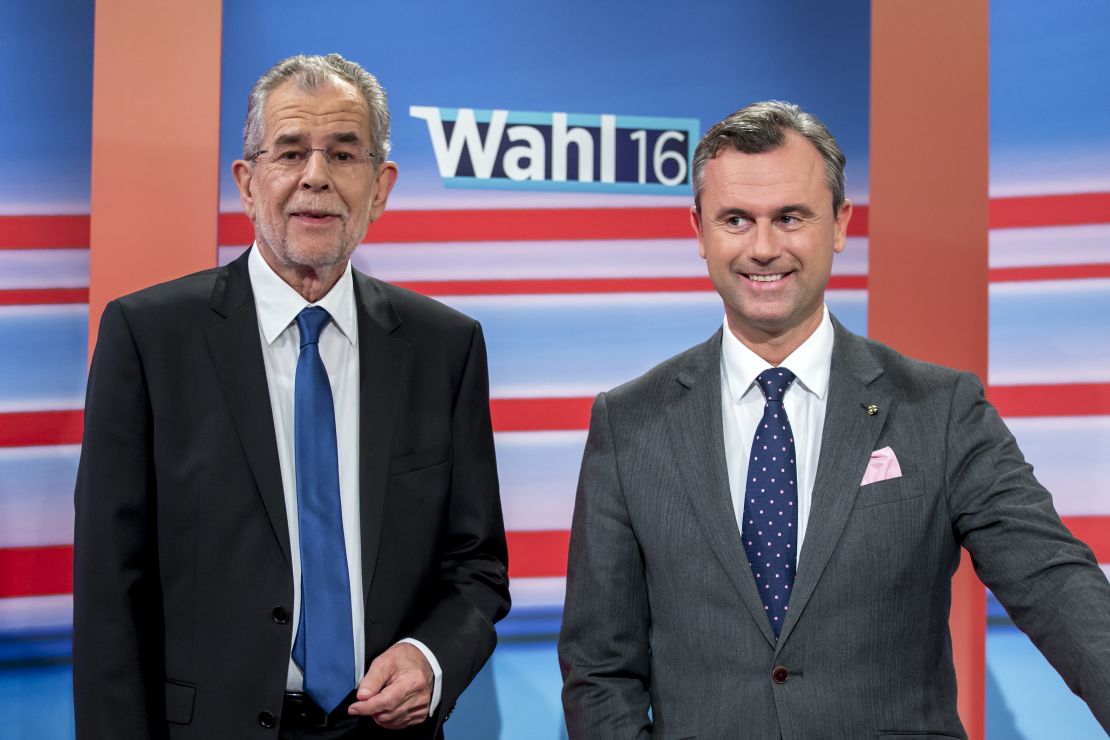Story highlights
Far-right presidential candidate Norbert Hofer admits defeat in Austrian election
His public persona had shifted from gun-toting strongman to smiling face of the far right
He’s the smiling, anti-refugee presidential candidate who was hoping to sweep into power in Sunday’s Austrian election.
But Freedom Party candidate Norbert Hofer has instead conceded defeat after exit polls showed an apparent win for his rival, Green Party candidate Alexander Van der Bellen.
Voters seemingly turned their backs on Hofer, who would have been the first far-right president in Western Europe since the end of World War II.

Exit polls announced by state broadcaster ORF showed Van der Bellen with 53.6% of the vote, though official results are not expected until late Sunday or early Monday.
It marks a significant increase for Van der Bellen, who narrowly defeated Hofer by some 30,000 votes during the original election in May.
Those election results were later annulled following concerns over how some postal ballots were handled.
The smiling face of the far right?
In recent months Hofer seemingly swapped his earlier gun-toting strongman persona for that of a gentler, cane-carrying character.
The 45-year-old former aeronautical engineer portrayed himself as the kindly face of the far-right, according to Oliver Rathkolb, professor of contemporary history at the University of Vienna.
“Hofer’s message is: ‘I’m strong but you don’t have to fear me,’” Rathkolb told CNN.
Over the course of the unprecedentedly long presidential campaign, Hofer’s public persona shifted from a pistol-carrying hardliner to the walking-stick-wielding survivor of a 2003 paragliding accident.
“In the first, and partly in the second round of televised debates, Hofer showed another face when he very aggressively attacked Van Der Bellen on policies,” explained Rathkolb.
“But obviously this was not so successful, and in the third round he decided to be smiling and nice, which is how the general audience in Austria sees him.”
What did he stand for?
Anti-refugees: “Anti-migration and the fear of Islamic terrorism have been Hofer’s key messages,” said Rathkolb.
“He wants a very small of flow of migration and refugees,” Rathkolb continued. “And where he is most outspoken is against Muslims who he says are bringing political Islam into Austria.”
Pro-EU: Early in the campaign Hofer indicated support for a referendum on Austria’s membership in the European Union, but he recently changed his tune.
“Hofer is not interested in a British-style referendum on Austria leaving the EU,” said Rathkolb. “That’s because he knows from the polls that Austrians are not interested in following the British example.”
Anti-Turkey: “Hofer is not only against Turkey joining the EU, but also against Turks coming to Austria,” said Rathkolb.
“His references to Turkish passport blocks should be seen as part of a larger Freedom Party campaign against Turks and Muslims – especially in the wake of large numbers of Syrian refugees traveling through Turkey in their attempt to reach Europe,” he added.
What cost him the election?
It’s too early to tell what motivated voters, but Rathkolb believed mixed messages from Hofer could ultimately cost him the presidency.
“If he’s not elected it’s because he changed his first round political appearance – showing himself as a tough man carrying a Glock pistol, and right now retreating on many issues,” he said.
“Trying to get votes from the middle and being as calm as possible may mean he struggles to mobilize his voters for a third time.”





